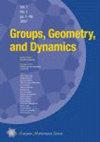Strongly scale-invariant virtually polycyclic groups
IF 0.8
3区 数学
Q3 MATHEMATICS
引用次数: 3
Abstract
A finitely generated group $\Gamma$ is called strongly scale-invariant if there exists an injective endomorphism $\varphi: \Gamma \to \Gamma$ with the image $\varphi(\Gamma)$ of finite index in $\Gamma$ and the subgroup $\displaystyle \bigcap_{n>0}\varphi^n(\Gamma)$ finite. The only known examples of such groups are virtually nilpotent, or equivalently, all examples have polynomial growth. A question by Nekrashevych and Pete asks whether these groups are the only possibilities for such endomorphisms, motivated by the positive answer due to Gromov in the special case of expanding group morphisms. In this paper, we study this question for the class of virtually polycyclic groups, i.e. the virtually solvable groups for which every subgroup is finitely generated. Using the $\mathbb{Q}$-algebraic hull, which allows us to extend the injective endomorphisms of certain virtually polycyclic groups to a linear algebraic group, we show that the existence of such an endomorphism implies that the group is virtually nilpotent. Moreover, we fully characterize which virtually nilpotent groups have a morphism satisfying the condition above, related to the existence of a positive grading on the corresponding radicable nilpotent group. As another application of the methods, we generalize a result of Fel'shtyn and Lee about which maps on infra-solvmanifolds can have finite Reidemeister number for all iterates.强尺度不变的虚拟多环群
如果在$\Gamma$中存在一个具有有限索引像$\varphi(\Gamma)$的内射自同态$\varphi: \Gamma \to \Gamma$,且子群$\displaystyle \bigcap_{n>0}\varphi^n(\Gamma)$有限,则称有限生成群$\Gamma$为强尺度不变群。这些群的唯一已知的例子实际上是幂零的,或者等价地说,所有的例子都是多项式增长的。Nekrashevych和Pete提出的一个问题是,这些群是否是这种自同态的唯一可能性,其动机是Gromov在扩展群态射的特殊情况下给出的正答案。本文研究了一类虚多环群,即每一子群都有限生成的虚可解群的这一问题。利用$\mathbb{Q}$ -代数壳,我们将某些虚多环群的内射自同态推广到一个线性代数群上,证明了这种自同态的存在意味着这个群是虚幂零的。此外,我们充分刻画了哪些虚幂零群具有满足上述条件的态射,这与相应的可根幂零群上存在一个正分级有关。作为该方法的另一个应用,我们推广了Fel'shtyn和Lee关于次可解流形上的映射对所有迭代都具有有限Reidemeister数的结论。
本文章由计算机程序翻译,如有差异,请以英文原文为准。
求助全文
约1分钟内获得全文
求助全文
来源期刊
CiteScore
1.10
自引率
0.00%
发文量
45
审稿时长
>12 weeks
期刊介绍:
Groups, Geometry, and Dynamics is devoted to publication of research articles that focus on groups or group actions as well as articles in other areas of mathematics in which groups or group actions are used as a main tool. The journal covers all topics of modern group theory with preference given to geometric, asymptotic and combinatorial group theory, dynamics of group actions, probabilistic and analytical methods, interaction with ergodic theory and operator algebras, and other related fields.
Topics covered include:
geometric group theory;
asymptotic group theory;
combinatorial group theory;
probabilities on groups;
computational aspects and complexity;
harmonic and functional analysis on groups, free probability;
ergodic theory of group actions;
cohomology of groups and exotic cohomologies;
groups and low-dimensional topology;
group actions on trees, buildings, rooted trees.

 求助内容:
求助内容: 应助结果提醒方式:
应助结果提醒方式:


